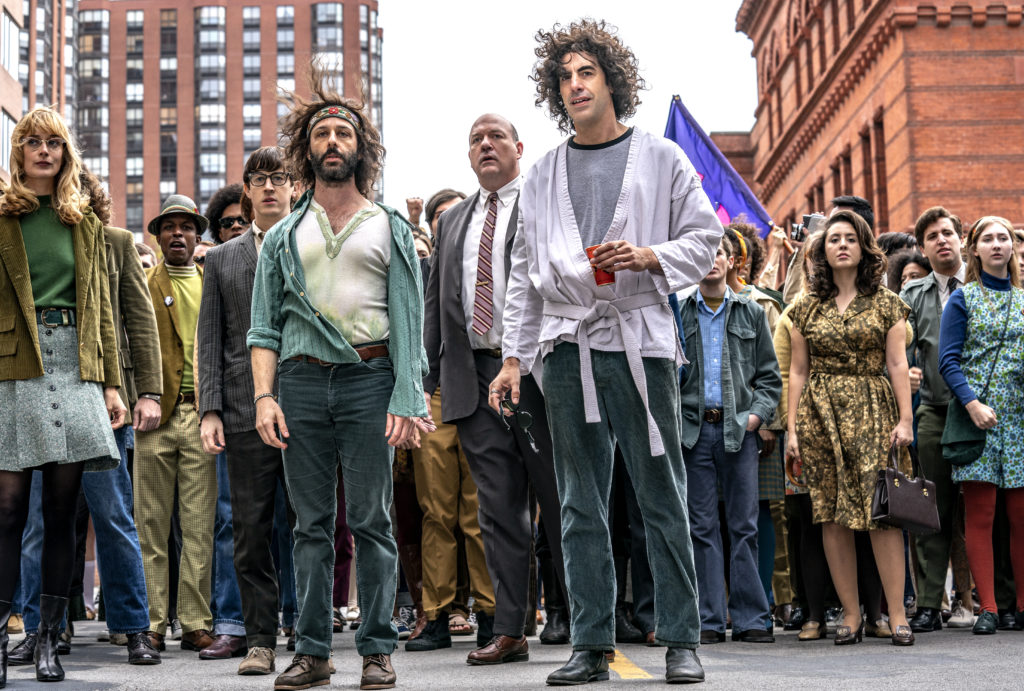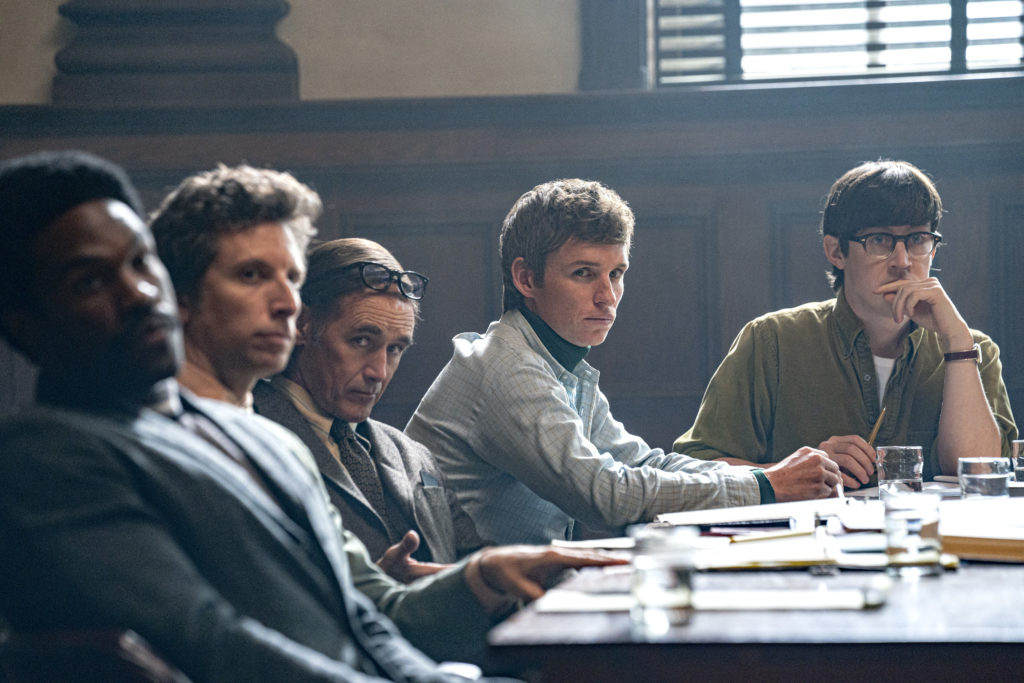Review by David Baldwin

It has been a few weeks since I watched The Trial of the Chicago 7. And in that time, I have continually put off writing the review. Not because I did not like it and not because I did not want to discuss it. No, the reason I kept procrastinating was because of the nagging feeling I had every time I thought about the film, some nervous tick that kept telling me I should like it much more than I did; how I should be reflecting more fondly on such an important work. That feeling kept manifesting every time I even considered writing and reduced me to staring at a blank page when I should be writing endlessly on this future Oscar-nominee. Part of me wonders if Aaron Sorkin ever feels the same way.
He probably doesn’t. The man is a legendary Oscar-winning writer — to go along with his multiple Emmy and Golden Globes wins — who is more creative than I ever will be. There’s no way he has ever just been caught up in staring at a blank page, unable to get the words out, right? It would be pretty wonderful if he did, if only to make bouts of writer’s block seem a whole lot more acceptable for the rest of us. It’s doubtful he would ever admit that though.
Sorkin’s second film, after 2017’s enjoyably flawed Molly’s Game, concerns the leadup, aftermath and the titular trial of a group of individuals charged with multiple offenses, including inciting a riot, during the 1968 Democratic National Party Convention in Chicago.
That is my simplistic, succinct description of The Trial of the Chicago 7. But like other Sorkin-written pictures, there is much more going on within it. While the film primarily details a completely ridiculous trial, it is also about racism, classicism, fascism, the anti-war movement and just plain doing the right thing in the face of extreme adversity. It was likely not Sorkin’s initial intention to release the film in a year packed with protests and riots, but it only gives The Trial of the Chicago 7 an even stronger platform to stand on.

And for many people, that will be more than enough to proclaim the film as a masterfully written and incredibly well acted courtroom spectacle and a sure-fire top Oscar contender (and practically pre-determined winner of the Best Ensemble Award at next year’s SAGs). It has a slick, compelling editing style that will keep you riveted, and has just enough wild and moderately profound moments to keep you entertained for all 2 hours and 9 minutes of its running time. The costuming, set design and sound are all aces. While I am not certain that the timelines are as cohesive as they should be — or that the ending is less disingenuous than I think it is — I stand up and take notice when a film introduces its main players with such gripping, quick witted ferocity and then does everything it can to maintain that intensity. In nearly every single way, The Trial of the Chicago 7 is a more ambitious and captivating project than Molly’s Game was, and Sorkin has grown as a director.
But he also proves that if he wants to continue directing, he is either going to need to direct someone else’s screenplay or better learn how to kill his darlings.
He knows how to make his dialogue sizzle on screen and wisely did away with the voiceover narration that plagued Molly’s Game. And with his editor Alan Baumgarten, Sorkin is able to jump between scenes relatively seamlessly. But he lets some scenes play out for far too long and cuts others off at the knees far before they should have ended. The jumpiness of some portions of the film does not help this, nor do some of the extended flashback sequences. I feel like another director taking a stab at projecting Sorkin’s writing to the masses would have been better equipped at streamlining and condensing the script Sorkin put together here.
An even bigger issue is the inconsistent tone. It is a dramatic, dialogue heavy piece first and foremost, but it leans into farce and camp far too often for its own good. Frank Langella’s character, Judge Julius Hoffman, is an absolutely despicable monster for the entire picture. Yet no matter how brilliant he plays the character, some of his lines and actions border on parody with how outrageous and over-the-top they are. I have no doubt that this is how Hoffman existed in real life, but the laughs his character generates threaten to take away from the more hard-hitting moments. That goes double for Noah Robbins and Danny Flaherty who play Chicago 7 members Lee Weiner and John Froines. Their characters are barely explained, given very little screen time and are treated like complete jokes. This is Sorkin’s obvious intention but it never feels anything besides bewildering, especially for anyone not familiar with the case.
And while Yahya Abdul-Mateen II is blisteringly good as Bobby Seale, I fear that Sorkin never really has a handle on what to do with him or the Black Panthers that orbit him. Sorkin understands their importance to the story, but they feel more amped up than they should be in order to make the film feel more relevant to the modern age. Worse, Seale never really exists outside of the courtroom — the only other times we see him are in the brief opening and in a minor scene in a prison visitation room. His shocking centre-piece scene is effective and knocks the wind right out of you, but I feel like there was so much more to this real life person than someone yelling at a racist judge to have their rights be acknowledged and respected.

But even in acknowledging these things, I know full well that I still enjoyed watching The Trial of the Chicago 7 despite its shortcomings. Sorkin’s writing is a thing of unequivocal beauty and it alone makes the experience worth watching. Beyond Langella and Abdul-Mateen, the cast is filled out by performers like Sacha Baron Cohen, Oscar-winner Mark Rylance, character-actor extraordinaire John Carroll Lynch, Emmy-winner Jeremy Strong and relative newcomer Alex Sharp who all turn in absolutely magnificent performances, no matter how big their role is. The luminous Michael Keaton has an extended two scene cameo, and it is just as amazing and scene stealing as you imagine. The always reliable Joseph Gordon-Levitt is good, but not as great as he usually is. And Oscar-winner Eddie Redmayne alternates between commanding the screen and getting lost in the background while everyone else overshadows him.
It doesn’t help that his English accent keeps cropping up at the most inopportune moments.
As a whole, The Trial of the Chicago 7 does more things right than it does wrong. It is compelling and entertaining, and packs in some truly terrific performances alongside Sorkin’s impeccable writing. It could and should have been better streamlined, but that likely will not matter to the masses nor the Academy voters. Expect this one to be one of April’s top contenders.
The Trial of the Chicago 7 is streaming on Netflix now, and is still screening in Select Theatres. Please ensure you are cautious and respect all Covid-19 protocols if you choose to see this film theatrically.